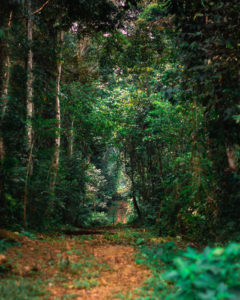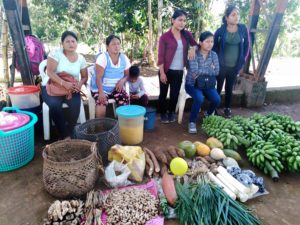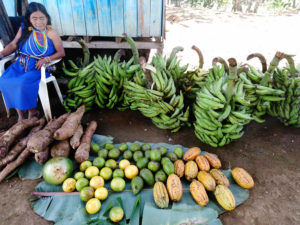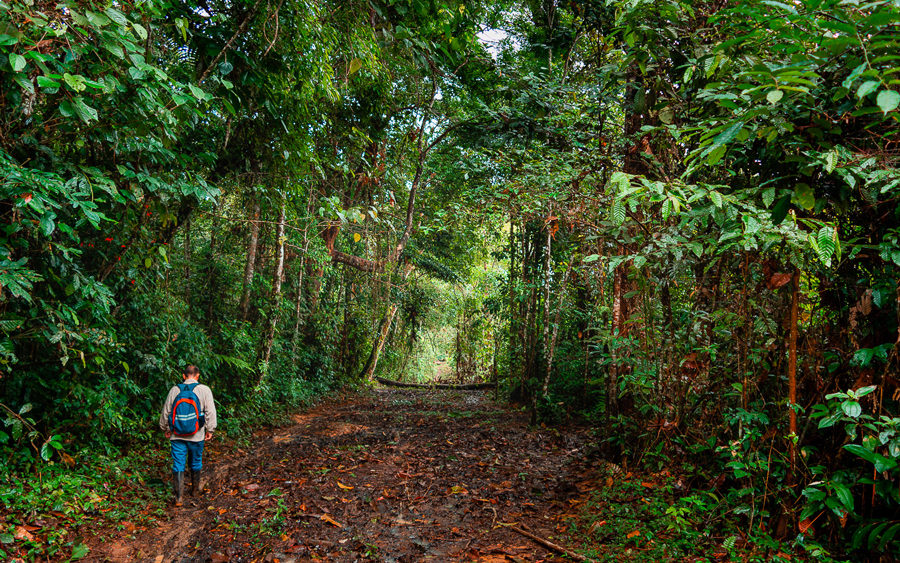Contributions of the gender approach with cultural relevance in the update of the Kutuku Shaimi Protected Forest Management Plan 2021-2025

The Forest and Protective Vegetation “Kutuku and Shaimi Mountain Range Forests” are considered the largest protective areas in the country. This area is part of the State Forest Heritage and it is located in the South of the Ecuadorian Amazon, in the Morona Santiago Province. Its declaration was issued in 1990 by the former INEFAN, now the Ministry of Environment and Water, and in 2015 an expansion of the area was approved, reaching 342,025 hectares. It covers a significant area located in seven cantonal Decentralized Autonomous Governments (GAD) and 13 parish GADs that influence the social, cultural, economic and political dynamics of the area and its population.
In 2012, the first Kutuku Shaimi Protected Forest (BPKS) Management Plan was built, and in 2017 its compliance period culminated. In June 2019, PROAmazonía, an initiative of the Ministry of Environment and Water (MAAE) and the Ministry of Agriculture and Livestock (MAG), with support from the United Nations Development Program (UNDP), together with the Confederation of Indigenous Nationalities of the Ecuadorian Amazon (CONFENIAE) presented the results of the “Management Effectiveness Evaluation” of this protected area during the years of implementation, in which recommendations are issued for updating the next management plan.
These documents constituted the baseline and the guidelines that guided the technical team of the FAO-PROAmazonía Project to develop the methodological proposal that guided the participatory process for its updating.
Photography: Jorge Armijos
Description: Kutuku Shaimi Protected Forest, Macuma Parish
As of July 2019, the project’s technical team initiated activities to update the management plan. Its methodological proposal focused on a participatory and technical process that took into account cultural relevance and the gender approach. Consultation, socialization and the steps to follow were a constant, both for the communities and the institutions; the consent of the former and the commitment of the latter contributed to common objectives, among which are: conservation and sustainable management of the protective forest, compliance with the environmental and social competencies of the local entities, together with the improvement of the inhabitants’ quality of life.
Updating the management plan was challenging because it is a large area, with a population of approximately 18,000 people of the Shuar nationality and, to a lesser extent, colonist settlements, who live in more than 100 communities. The FAO-PROAmazonía technical team approached the process with a solid methodological proposal that required adaptive, flexible and time-sensitive management adapted to the demands of community participation.
The information survey of the area allowed the first approaches in the area of influence. CONFENIAE, the Interprovincial Federation of Shuar Centers (FICSH), the Shuar Nation of Ecuador (NASHE), the Shuar Arutam People (PSHA), the provincial delegation of MAAE, the GAD, as well as the local PROAmazonía team were strategic allies and relevant actors in the territory. In the initial workshops with the communities, the FAO-PROAmazonía technical team informed about the importance of updating the management plan, as well as the socialization of the methodological steps.
Subsequently, the face-to-face participatory diagnostic workshops were resumed in October 2020 due to the health emergency caused by the coronavirus. The problems identified by both women and men, such as the economy, community life, as well as the traditional and current way of life of the Shuar nationality in the protective forest, were gradually transformed into alternative solutions and, finally, into project profiles from a gender approach linked to four programs: 1) Territory and participatory governance; 2) Sustainable production and bio-economy; 3) Sustainable forest management; and 4) Gender and interculturality. These, in turn, are related to the zoning areas established by the MAAE: (1) Permanent Protection; (2) Other Uses; (3) Restoration; and (4) Natural Forest Management.
In the participatory workshops, the majority of trustees and partners expressed their concern about two problems that the BPKS communities are facing:
We are more than 60 Shuar families that do not have title [of property] in this community, [the] settlers [who live in the BPKS] do not have title either, we have to invite them to see if we can solve this. Before there was no need for titles, everything was ours, the grandparents left us this land, they took care of it for us. This is the biggest problem we have. Mining is another [problem], the FICSH held an assembly and we decided that we do not want mining, but some trustees have allowed it to enter the communities because it will give them work. According to the testimony of participating trustees from the Aso. Kanus. Morona Santiago, December 2020.
Titling and mining are also the main problems for women. They also expressed concern about the loss of Shuar Aja[1] cultural diversity and practice among young and adult women. Regarding commercialization, they argued that soybean products are not valued by people from the cities as much as those from the highlands, and they stated the need to have spaces to sell and to ensure fair prices. They reflected on their little participation in training spaces and in community policy. They also exposed gender violence as a deeply felt problem that affects many women.
“My mom told me that her mother-in-law used to tell her that 60 products must have the Shuar Aja. We no longer have this amount because we have not practiced, the business has started, because of the sale of cassava, or Chinese potatoes; we no longer have it. The grandmothers had up to seven kinds of sweet potatoes, five kinds of yucca, they didn’t lack anything, they were well fed. Now I have Chinese potatoes, cassava, bananas that we eat at home and I also sell, sweet potatoes I no longer have because I have to clean a lot and the snake comes a lot.” (Testimonies of Shuar women, Aso. Sevilla Don Bosco. Morona Santiago, October 2020).
In contrast, there are women who do keep the Shuar Aja, as is the case of the families that live inside the BPKS:
“My sisters say you are like mom, you keep like in the old days, just like my grandmothers I have everything, medicinal plants, maicawua, ginger for COVID that they recommended to us to take as a remedy, we prepare it with another plant, and use it also for irritation of the throats. Everything in the house is for my house, I have never sold anything,” commented an adult Shuar woman from the Santiak Association during the work meetings.
In relation to capacity building and training on specific rights such as gender violence and political participation, the women stated that “There are women who are afraid to speak out; many are mistreated. There are female trustees, [they are] authorities with strong character, yes there are, they are few, but yes there are. We need to know our rights, we need to change in order to defend ourselves and defend the young women, [they] are our heirs” (Testimony of women leaders of the Sevilla Don Bosco Association, October 2020).
These and other issues, through the use of participatory tools, were converted into project profiles with a gender and cultural relevance approach. Subsequently, they were socialized to the delegations of the GADs of the cantons and parishes related to the BPKS to establish synergies with the objective that the profiles are considered in their planning, and in this way, the management plan can be implemented.
The contributions of the gender approach and cultural relevance enriched the management plan by reflecting the complete reality of women’s and men’s problems inside and outside the protective forest. This is why their proposals arise from these experiences.
Highlights:
- Representatives from at least 65 communities participated in the initial socialization workshops and in the process of constructing the management plan.
- Both female and male trustees participated in more than 20 workshops on zoning, diagnosis, vision, project profiles and management model.
- Three workshops were organized: 2 virtual and 1 face-to-face with the attendance of 40 technicians from the GADs and PROAmazonía.
- In the first semester of 2021, the management plan for the Kutuku Shaimi Protected Forest 2021-2025 will be updated.


Photographs: Susana Albán Bedón
Description: Women of the Shuar nationality sell Aja products at the local fair in Macuma. (Taisha, October 2020)
[1] The Shuar Aja is the production space for family self-subsistence, the surpluses are sold by some women of the nationality. The aja is the equivalent to the garden, plot or chakra.
Author: Susana Albán Bedón, Sociocultural, Gender and Environment Specialist-FAO-PROAmazonía Project.
 Español
Español English
English
